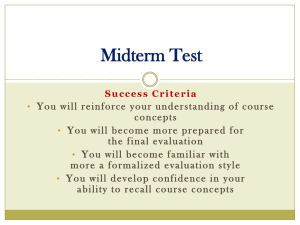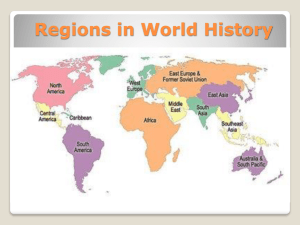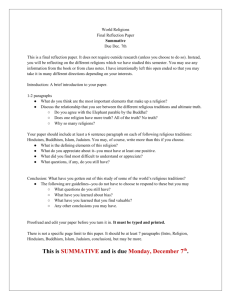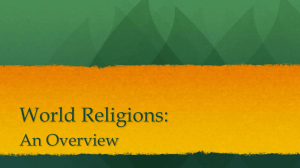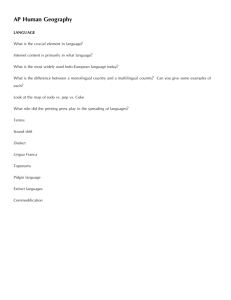World Religions
advertisement
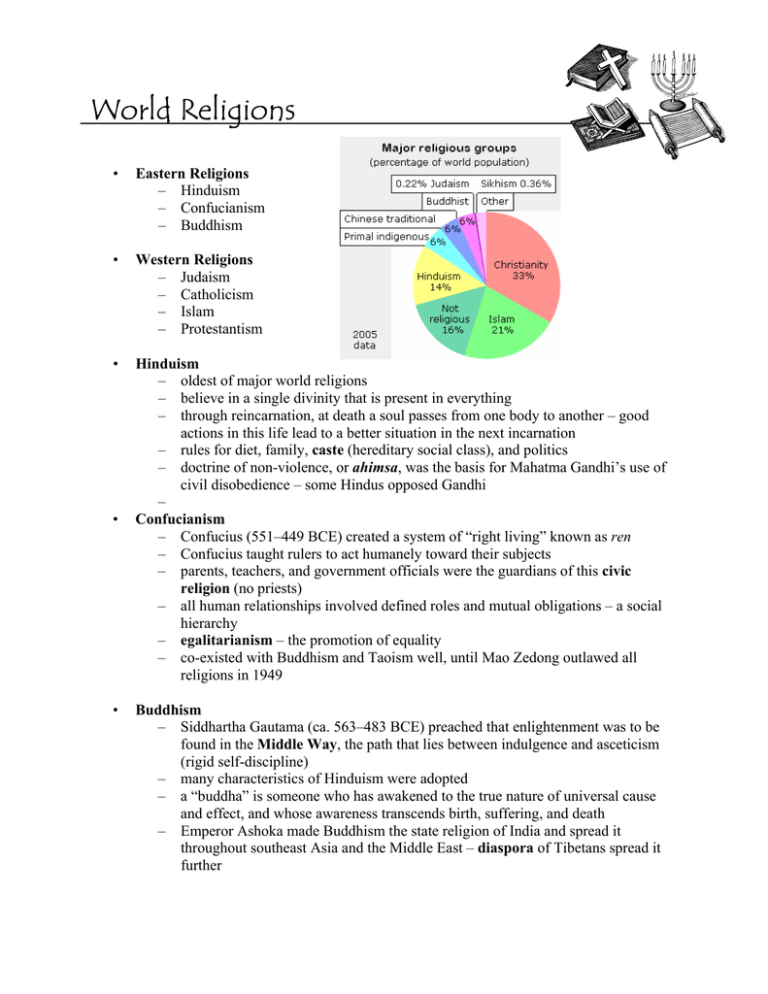
World Religions • Eastern Religions – Hinduism – Confucianism – Buddhism • Western Religions – Judaism – Catholicism – Islam – Protestantism • Hinduism – oldest of major world religions – believe in a single divinity that is present in everything – through reincarnation, at death a soul passes from one body to another – good actions in this life lead to a better situation in the next incarnation – rules for diet, family, caste (hereditary social class), and politics – doctrine of non-violence, or ahimsa, was the basis for Mahatma Gandhi’s use of civil disobedience – some Hindus opposed Gandhi – Confucianism – Confucius (551–449 BCE) created a system of “right living” known as ren – Confucius taught rulers to act humanely toward their subjects – parents, teachers, and government officials were the guardians of this civic religion (no priests) – all human relationships involved defined roles and mutual obligations – a social hierarchy – egalitarianism – the promotion of equality – co-existed with Buddhism and Taoism well, until Mao Zedong outlawed all religions in 1949 • • Buddhism – Siddhartha Gautama (ca. 563–483 BCE) preached that enlightenment was to be found in the Middle Way, the path that lies between indulgence and asceticism (rigid self-discipline) – many characteristics of Hinduism were adopted – a “buddha” is someone who has awakened to the true nature of universal cause and effect, and whose awareness transcends birth, suffering, and death – Emperor Ashoka made Buddhism the state religion of India and spread it throughout southeast Asia and the Middle East – diaspora of Tibetans spread it further • Judaism – Romans destroyed the Temple of Jerusalem in 70 CE, forcing Jewish people to spread throughout the world (diaspora) – in some “host countries”, they were accepted and given much religious freedom; in others, they were viewed as outsiders and treated with hostility – although both Jews and Arabs are Semitic peoples, “anti-Semitism” has come to mean hatred of the Jewish people – Hitler’s Holocaust (1933-1945) was the most extreme example of anti-Semitic behaviour • Catholicism – led by the pope, who is seen as the successor to Saint Peter as Christ’s representative on Earth – eastern and western churches evolved • western Christians used Catholicism to political advantages (carrying out the Spanish Inquisition, creating denominational schools, and discouraging divorce, abortion) • eastern Christians saw themselves as Orthodox – following the principles of the original religion • excommunication of two leaders in 1054 finished the schism • John Paul II reached out to the east, but no reconciliation • Islam – Islam is an Arabic word that means “submission” – a follower of Islam is called a “Muslim,” which means “one who submits to the will of Allah” – Muhammad (570–632 CE) recorded the word of Allah, in the Qur’an, the holy book of Islam – there is no separation of church and state in Islamic countries – no discrimination based on race or class – Christians and Muslims began fighting over access to holy sites in Jerusalem – political violence contradicts Islam’s traditional teachings - jihad (holy war) is actually the ongoing inner struggle of conscience to be a better Muslim • Protestantism – is the politics of dissent – Martin Luther (1483–1546) and the Protestant Reformation opposed the power of the Roman Catholic Church – England’s Act of Supremacy made the king or queen of England the head of the new Church of England – John Calvin, John Knox, and others appealed to the middle classes and gave rise to political democracies – Calvinism, Presbyterianism, and political voices of conscience such as Quakers are all forms of Protestantism World Religions
